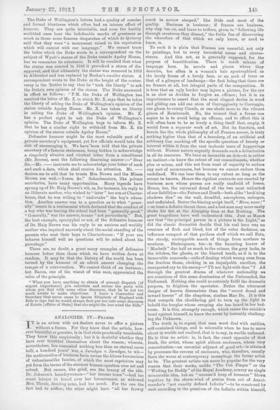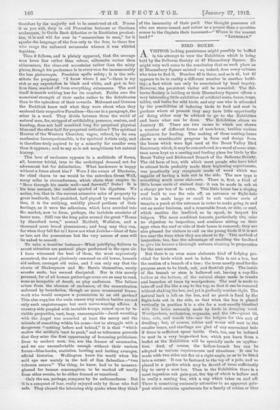ANALOGIES. IV.—FRkmms.
IT is an axiom with art dealers never to offer a picture without a frame. For they know that the article, how- ever beautiful or genuine, is in that state practically unsaleable. They know this empirically ; but it is doubtful whether they have ever troubled themselves about the reason; wherein, nevertheless, lies concealed nothing less than an eternal easus WU, a hundred years' war, a Iarndyee v. .7 crud to wit— the mathematics of business facts versus the literae human /ores of unbusinesslike fancies, of which the most capricious may yet form the terms of the sternest human equation ever set and solved. But causes, like grief, are the luxury of the idle. Dr. Johnson's laundrywoman—" her income tears "—had too scant leisure to brood over her bereavement, as widowed Mrs. Thrale, desiring none, had too much. For the one the fact had to suffice; the other might have "all her frowsy couch in sorrow steeped," like Dido and most of the quality. Business is business ; if frames are business, why clap 'em on, and leave to triflers, given to "following life through creatures they dissect," the futile fun of discovering the wherefore of that which we only know, or need to know, is.
To such it is plain that Frames are essential, not only to paintings, but to every terrestrial scene and circum- stance. And this not, as is generally supposed, for the purpose of beautification. There is much misuse of language here. In novels and places where they describe, too often is a woman's hair apostrophized as the lovely frame of a lovely face, or an arch of trees as that of a glimpse of landscape—the fact being that these are no frames at all, but integral parts of the composition. It is true that an ugly border may injure a picture, for the eye is as slow as Atrides to forgive an offence ; but it is an impertinence to assert that the most elegant device in wood and gilding can add one atom of Correggiosity to Correggio, one gleam to sunny Claude, or one shade more to the vibrant gloom of Rembrandt. No, the utmost that a frame can aspire to is to avoid being an offence, and to effect this it will often have to be so lovely a thing itself that, empty, it would form a separate work of art. But its function, and herein lies the whole philosophy of all Frames soever, is truly nothing higher than that of a boundary, of an artificial and arbitrary line marking off the specific quantum of beauty or interest within it from the vast inchoate mass of happenings without. Human nature urgently demands such a delimitation in all its concerns. We have as incurable an itch—it is rather an instinct—to know the extent of our commitments, whether plus or minus, and this not from want of capacity to endure any sort of occurrences, but because we cannot endure them undefined. We can bear them to any extent so long as the extent he known. Hence the rigidest contracts are exacted by business men whose purses are really unafraid of losses. Hence, too, the universal dread of the two most unlimited of our liabilities—the Future and Death—both alike "beelening shadows dire" on the wall, dreadful, amorphous, unbegun, and unfinished. Better the blazing script itself, "Mena, mene " —at least a definite threat there, and a lost man may more easily shake his fist at the Almighty than at flat Nothing. The great tragedians have well understood this. Just as Menet saw that "the principal person in a picture is the Light," so did the classic dramatist decide that his real hero was no creature of flesh and blood, but of the outer darkness, an influence compact of that perilous stuff which we call Fate, the steady, unstoppable march of things from nowhere to nowhere. Shakespeare, too—is the haunting horror of " Macbeth " due half so much to the crimes, the gory locks, to the witches, the ghosts, or the blasted heath, as it is to the immovable anaconda—coils of destiny which wrung even from the fearless thane, choking in an impalpable smother, the unexpected cry to his enemy—" I'll not fight with thee" P All through the greatest drama of whatever nationality we are conscious of this same domination of the Unbounded, the Unframed. Nothing else could so certainly fulfil the dramatie purpose, to frighten the spectator. Better the uttermost danger of known dimensions than the "secret dread and inward horror" of the shapeless, sizeless May Be. It is this that compels the shuddering girl to turn up the light to behold the burglar whose creeping she has heard in her bed- room. It is this, strangely enough, which raises the suicide's hand against himself, to know the worst by instantly challeng- ing the Unknown. The truth is, to repeak.that man must deal with entities, self-contained things, and is miserable when he has to move about in worlds not realized, that is to say, in worlds unfenced. He is thus no artist: is, in fact, the exact opposite of that freak, the artist, whose spirit abhors enclosure, whose very concentration—an essential adjunct of good art—is attained by processes the reverse of enclosure, who, therefore, usually fares the worse at contemporary moneybags the better artist he be. The greatest artists can never be popular for the very reason that their works, unlike "The Cut Finger" or the "Waiting for Daddy" of the Royal Academy, convey no single measurable idea, but an " unsunn'd heap of treasure" blown together by the storm-wind of genius from out of Anaxi- mender's "not exactly defined Infinite"—to be construed by each according to the quantum of the Infinite within himself,
therefore by the majority not to be construed at all. Frame it as you will, deep in old Florentine festoons or Carolean arabesques, in Guide Book didactics or in Ruskinian preciosi- ties, it is and will for ever be " measureless to man," for it speaks the language of the free only to the free, to those few who range the unfenced savannahs whence it was whirled together.
Thus it follows, and is plainly apparent, that the average man loves line rather than colour, silhouette rather than chiaroscuro, the clear-cut mountains rather than the misty though his preference is in every case for immeasurably the less picturesque. Precision spells safety ; it is the sub- stitute for prophecy. "I know where I am "—there is my risk or my expectation in black and white, and girt in fair firm lines, marked off from everything extraneous. The soul itself demands nothing less for its comfort. Faiths owe the numerical strength of their ranks rather to the definiteness than to the splendour of their rewards. Maboraet and Gotama the Buddhist knew well what they were about when they enclosed their respective Paradises—the one in a paragraph, the other in a word. They divide between them the world of natural men, for, stripped of artificiality, pretence, custom, and humbug, does not half mankind long for perpetual physical bliss and the other half for perpetual extinction P The spiritual Heaven of the Western Churches, vague, refined, by its own confession Incomprehensible, is for spiritual Artiste only, and is therefore truly aspired to by a minority far smaller even than it appears ; and to say so is not naughtiness but natural history.
This love of enclosure appears in a multitude of forms, all, however trivial, tree to the archetypal demand not for adornment but for delimitation. What landowner is happy without a fence about him P Were I the owner of Blenheim, its chief charm to me would be the unbroken Great Wall, many mike in circumference, which shuts that empire ha. "B01.0 through hie castle wall—and farewell," Duke] It is his true coronet, the reallest symbol of his dignities. We notice, too, that in the current extensive sales of property by great landlords, half-panicked, half-piqued by recent legisla- tion, it is the outlying, untidily placed portions of their heritage, as it were the adhesions, which have crowded into the market, now to form, perhaps, the inviolate enceintes of lesser men. Still run the long palea around the great " House by Stamford town," around Hatfield, Wollaton, and a thousand more broad pleasaunces ; and long may they run, for when they fall fiat to I know not what Jericho—blast of fate or law, not the possessions but the very nature of man will lie naked to assault.
To take a humbler instance—What petrifying failures to arrest attention are pastoral plays performed in the open air. I have witnessed the best of them, the most expensively accoutred, the most gloriously enseened on old lawns, beneath old cedars, amongst old ruins, and I can only say that the charm of Shakespeare and Mr. Barrie themselves, surely arcades ambo, has seemed dissipated. Nor is this merely personal, for of all human gatherings none are so easy to read, none so incapable of deceit, as play audiences. The failure arises from the absence of enclosure, of the concentration enforced by boundaries, though as mere ornamental frame- work who would compare a proscenium to an old garden? This also supplies the main reason why modern battles are not only such nnpictnresque but such nerve-wearing affairs. A country-side peopled with invisible troops, rained upon by in- visible projectiles, vast, hazy, unmanageable—Jacob wrestling with the Angel was accorded at least the mercy and the miracle of something within his arms—but to struggle with a dangerous "nothing before and behind," it is that "which makes the soldier's 'cart to panic," and so triturates generals that they seize the first opportunity of becoming politicians. Dear to modern man, too, are the frames of summaries, and we are uncomfortable enough without their various forms—blue-books, statietics, bowling and batting averages, official histories. Wellington knew hie world when his cold eye saw mainly in the hell of San Schastion—" two volumes octavo." The thing, he knew, had to be measure- glassed for human consumption, to be marked off neatly from other events, to be either framed or unnoticed.
Only the sea, perhaps, conquers by its unfratnedness. But it is a conquest of fear, really enjoyed only by those who feel safe. They aboard the labouring ship quake when they think of the immensity of their peril. One thought possesses all who are storm-tossed, and rather as a prayer than a question comes to the Captain their incessant—" Where is the nearest























































 Previous page
Previous page